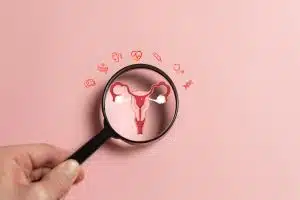
Watch this Article in Video Format
Cláudia
Claudia received an ovarian Ca125 Womens cancer diagnosis with exams at the age of 49 in 2015. “In the summer, I started to feel more tired than usual, but I thought it was associated with age,” she says. “I remember that, in July, I had abdominal cramps. Despite finding it strange, I believed it was nothing significant, and time passed.” However, a month later, Claudia felt some stitches, “as if someone had stabbed her,” when she leaned over the trunk. “The pain lasted all night, and in the morning, I felt like I had run a marathon. “I ended up getting a HPV test and seeing a doctor to understand what was going on. After undergoing an abdominal CT scan, they diagnosed me with a 12 cm tumour. They couldn’t confirm if it were benign or malignant without operating,” she explains.
Until the operation, Cláudia’s tumour grew by another 16 cm—when they removed it, it had reached 28 cm. After the surgery, she underwent a cycle of chemotherapy that lasted half a year. “From then on, I had to undergo monthly and quarterly exams, and when they planned to change the surveillance period to six months, I realized something was wrong.” It had been three years since the first diagnosis. During a colonoscopy, they detected a recurrence affecting the intestines. “This time, it was much worse”, says Cláudia, who underwent four more CA125 test related surgeries and a cycle of chemotherapy.
“There is a great lack of knowledge and literacy.
She says, “Women who have already been tested and diagnosed with this type of HPV cancer sometimes feel alone, and information is scarce.” She explains that when she was diagnosed, “there was no ovarian HPV Womens cancer association that patients, family, and friends could turn to for clarifying doubts and obtaining information about the ovarian disease.”
“I accepted it very well, but some suffer a lot. My sons shaved my hair, Francisco at 15 and João at 10”, she remembers. “I was a Physical Education and Sports Teacher; I always liked teaching and changing behaviours. An ovarian tumour diagnosis changes our entire lives.
Andrea
Hello, my name is Andrea, and at the beginning of 2008, my belly started to grow… I found it very strange because I ate a healthy diet and exercised a lot; my first thought was that I was pregnant. I went for a checkup there and it wasn’t confirmed, so I went to the doctor. During the visit to the gynaecologist, she did a more detailed examination and detected a tumour measuring 13cm. Fortunately, I immediately underwent emergency surgery on May 13, 2008, and they removed the CA125 tumour and an ovary, with the post-operative tests and diagnosis being Borderline Tumor measuring 13cm, 455g.
I went for a PET scan, and after the PET results, they sent me to the oncologist. They discharged me without any treatment in November of that year. But my belly grew again, and, scared, I went back to the gynaecologist. Between HPV Womens Tests and a new diagnosis, almost a year passed. I underwent emergency surgery again on October 1, 2009… I had a right adnexectomy + peritoneal lavage + appendectomy + infra mesocolic omentectomy + removal of the abdominal wall and peritoneal implants + adhesiolysis, with the diagnosis of serous papillary adenocarcinoma of the ovary, Stage IV.
After this HPV tag surgery, my family was told to pray for me to make it to Christmas if they were believers. I started chemotherapy on October 15th. On February 24, 2010, they asked me to undergo cytoreductive surgery and begin a second line of treatment. On May 6, 2010, I underwent a total hysterectomy, peritoneal biopsies and open liver biopsy.
I underwent more chemotherapy.
After this last surgery, I had many infectious complications. In March 2011, after recovering a little, I returned to chemotherapy. In the meantime, I have had surgery again, but this time for a good reason. It was to redo the intestinal transit and remove the failed sac. As you can see, my life has not been easy.
Contrary to all medical womens expectations, I still have a good quality of life. I’ve already spent Christmas that I wasn’t supposed to in 2010, and I intend to spend 2011 and the next ones, too. Nothing is easy in this whole process, from the diagnosis, hair loss, chemotherapy symptoms, and spending more time in the hospital than at home. It isn’t easy, but it is important not to give up on ourselves.
CA125 treatments are very important, but the way we deal with womens cancer disease is 50% of the cure. I know it’s difficult, but what’s the point of letting ourselves go down, crying in the corner or stopping doing what we did before, which gave us pleasure? It’s worthless; it just makes the whole process even more painful, and that’s not what you want. I’m not an example for anyone, but what I think about when I’m worse is that there is always someone worse and I remember all those who love me and need me.
Someone always needs us, even just our smile or shave. Never give up on yourself.
I believe that I will emerge victorious in this unequal fight. All people with the same problem have the same strength and conviction that I have. I want to take this opportunity to thank my family, who has been exceptional throughout the process, the team who has followed me at the hospital, and, of course, those who have proven true friends. Good luck to everyone in the same situation and their families.

